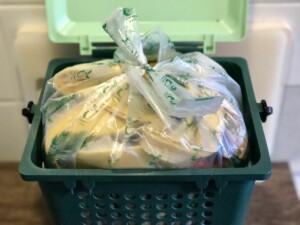
Source: Verbund kompostierbare Produkte e.V.
A new standard has been published this summer to establish the requirements and specifications for home compostable carrier bags. This should put an end to the debates around home composting, which we all know takes place under less controlled conditions and lower temperatures than industrial composting processes.
When the European Packaging and Packaging Waste Directive was amended in 2015, the main focus of the EU was to reduce plastic bags. Since then, exemptions could be made for industrially compostable bags made from e.g., PLA or starch blends. At the same time, discussions started concerning the biodegradability of certain materials and applications in home composting, i.e.at lower temperatures and under less controlled conditions than in industrial composting facilities. In 2017, France banned conventional plastic bags and film packaging, allowing only biobased and home compostable options, supported by a national standard (NF T51-800) that includes procedures and requirements relevant for home compostable plastics.
Based on the French standard, the European standard EN 17427 (DIN EN 17427:2022 “Packaging – Requirements and test methods for home compostable carrier bags”) had been developed at the European level during the past years. Its final version was published in July 2022. However, the scope of this standard is limited to home compostable carrier bags. In addition to requirements for disintegration and biodegradability, the standard also includes specifications for extensive ecotoxicity tests and clear rules on environmentally hazardous substances and substances of very high concern.
The biggest difference between the conditions and requirements for home composting and industrial composting is the temperature, with industrial composting facilities reaching temperatures of 50 to 70 °C, while home composting takes place at rather ambient temperatures (with differences depending on season and geographic location). At the same time, the handling of the compost also plays a major role, with gardening and composting practices varying a lot with every practitioner. Therefore, the new EU standard also includes guidelines on how well-managed home composting should look like and under which the certified bags then also biodegrade.
However, the most important standard for the composting of plastic products, which supports in the collection of more biowaste, remains to be EN 13432 (DIN EN 13432:2000-12 “Packaging – Requirements for the recovery of packaging by composting and biodegradation – Test scheme and evaluation criteria for the classification of packaging”). Some kitchen waste, such as meat and fish, is not suitable for home composting, because it has a particularly high energy content. Home composting can therefore complement, but not replace industrial composting.
In recent years, there has been increasing criticism of EN 13432 and, not least for this reason, the standard is currently being revised. Some of the stricter requirements applied to home compostable plastics will also be included in this revised version of EN 13432, which means that the standard will continue to be a reliable basis for the certification of industrially compostable bags and packaging.
The original article by EUBP Deputy Managing Director and Head of Environmental Affairs Constance Ißbrücker was initially published online in Packaging Journal (2 November 2022) and translated from German into English. Read the original German version here